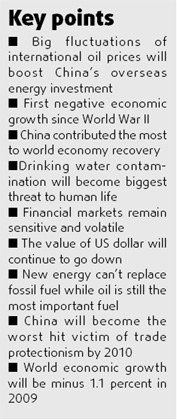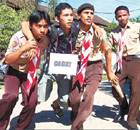Global General
Yellow book ranks China 7th in overall strength
By Lei Xiaoxun (China Daily)
Updated: 2009-12-25 08:26
 |
Large Medium Small |
Negative growth, financial turmoil, trade issues, water pollution and military spending were keywords highlighted by scholars from the Chinese Academy of Social Sciences as they assessed the comprehensive strength of 11 nations. The results appear in the academy's latest yellow book on the world economy and international situation.
The US, Japan and Germany came out at the top, while China ranked seventh on the list.
Continuous armed conflict, terrorism and financial turmoil in 2009 have posed grave threat to the world, the book points out. And 2009 marked a year for a changing international power balance, with increased influence for newcomers to the global stage.

China experienced a steady lift of its influence both in regional and international realms. "We have seen deepening degree of China's participation in international issues," said Qiu Yuanlun, researcher with the academy.
The indicators in the book's assessment includes territory and natural resources, population, economy, military and science, said Li Shaojun, director of the Chinese Academy of Social Sciences' World Economics and International Politics Institute.
The nations were also evaluated on their social development, sustainability, security, domestic politics and international contribution.
The book noted that US is still regarded as the only superpower in the wake of the economic meltdown this year. "US tops in every indicator except for natural resources," said Li Shaojun, and it has many advantages, which are said to be "unparalleled" in the yellow book.
Military spending has risen dramatically while the worldwide economic downturn has vaporized wealth for almost everyone in 2009, said the book.
In terms of military force, the US, China and Russia lead the list. According to the book's rating system, the US achieved 90.08 points in military strength, 56.78 points more than runner-up China. "The gap between US and China is obvious, and the reason for China's high ranking in the sector is the large number of troops and weapons," said Li.
Whilst US saw no challenge in comprehensive military strength, its yearly military expenditure is 32 percent more than the total of the other 10 nations.
Russia tops the list of aggregate number of weapons, with more than 22,800 tanks. Both China and US have less than 8,000 in their armories.
The yellow book analyzed statistics from Stockholm International Peace Research Institute: 2008 world military expenditure is estimated at $1.464 trillion, a 4 percent rise on that of 2000, and 45 percent more than 1998.
The figure in 2008 is equivalent to 24 percent of global GDP. And 2000 US military spending alone was $294.4 billion. By 2008, it has increased to 607.3 billion. Between 2001 and 2008, the US spent $797 billion on the war against terrorism, of which $603 billion were spent in Iraq. The US is still bogged down in Iraq and Afghanistan, therefore, the figure is likely to increase.






